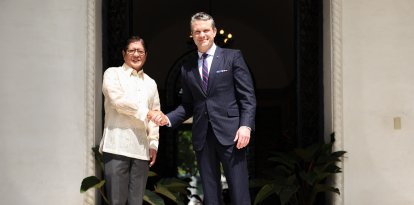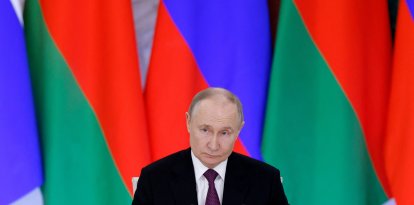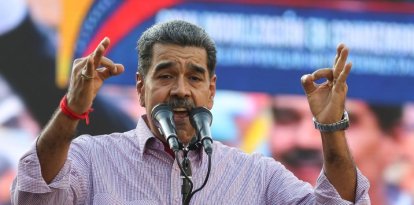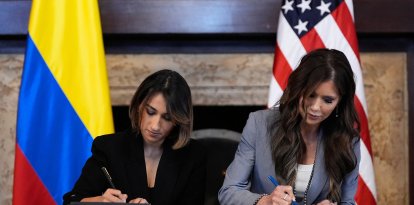U.S.-El Salvador nuclear agreement: migration, energy and Chinese expansionism.
The Trump Administration achieves with this agreement important security and geopolitical steps by curbing Chinese expansionism in El Salvador, a victory that could be replicated in other Latin American countries.
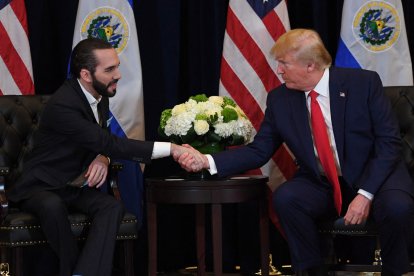
Presidents Nayib Bukele and Donald Trump, in a file image.
The administration of president Donald Trump and the government of Nayib Bukele announced on February 3 that the United States and El Salvador had reached a nuclear agreement promoting peaceful cooperation between the two countries in this type of energy, in exchange for another "unprecedented" immigration agreement in which Salvadoran authorities pledged to receive illegal immigrants of any nationality who have committed crimes on U.S. soil.
The energy agreement, called the Memorandum of Understanding on Strategic Civil Nuclear Cooperation (NCMOU), was signed by U.S. Secretary of State, Marco Rubio, and by the Minister of Foreign Affairs of El Salvador, Alexandra Hill. In a statement, the State Department explained that the NCMOU represented "the first step toward building a strong civil nuclear partnership between the two countries," with the goal of promoting prosperity in the region while simultaneously "enhancing the energy security" of El Salvador.
While the Central American country achieves an unquestionable triumph with this nuclear agreement, the truth is that for the Trump Administration the deal reached with the Bukele government is also great news, as it guarantees thatillegal immigrants who have committed crimes in the country can be deported regardless of the fact that the governments of their respective nations present obstacles when it comes to receiving them. Likewise, the Republican Administration also achieves with this agreement important steps in terms of security and geopolitics by stopping Chinese expansionism in El Salvador, a victory that could be replicated in other Latin American countries.
Aragua Train and Mara Salvatrucha
In a press conference following the agreement, Rubio commented that the main focus of illegal immigrants with criminal records who could be sent to the Central American country was on the terrorist organizations Tren de Aragua and the Mara Salvatrucha, also known as MS-13. "Bukele has shown that things can be done differently and effectively. His commitment to accept and incarcerate criminals from any country, including those from violent gangs like MS-13 and the Aragua Train, will make the U.S. safer," Rubio commented.

Terrorism Confinement Center (CECOT), in a file image.
On the other hand, Bukele detailed that these illegal immigrants would be held in the Centro de Confinamiento del Terrorismo (CECOT), the famous maximum security penitentiary center, inaugurated by his government just two years ago. While the CECOT has a maximum capacity of 40,000 inmates, it is estimated that there are currently around 15,000 inmates.
These figures represent a huge advantage for the U.S. government, since, although the official number of members of the Aragua Train operating inside the country is unknown, it is estimated to be less than 2,000. There would also be enough space for MS-13 members still operating in the United States, since, according to a report by the Department of Justice (DOJ) produced in 2018, the criminal gang would count just over 10,000 membersacross the territory. Even if these numbers were to double, the famous Salvadoran prison would still have enough capacity to house all of these criminals.
Nuclear deal could reduce El Salvador's dependence on fossil fuels and move it away from China
One of the details that have gone unnoticed about Bukele, at least outside El Salvador, is his insistence for renewable energies in order to leave behind the dependence that his country has historically had on fossil fuels, which has been one of the shackles that has hindered his progress.
Taking into account that El Salvador's oil and gas sector is one of the smallest in Latin America, Bukele has launched an energy policy focused on diversifying energy sources to break this dependence. However, even though these plans have managed to reduce the consumption of imported fossil fuels as the main source of electricity to 39%, this is still a figure high enough to see almost improbable the scenario in which El Salvador could materialize its energy sovereigntyand enjoy the economic advancement that this would bring.
It is precisely in this context where the surprising nuclear agreement between Bukele and Trump is set, with the US president finding a crucial ally in his immigration policy, and the Salvadoran leader getting a kind of Holy Grail with which he can probably materialize his long-awaited energy plan and establish a turning point both in his country and in the region for the long term.

Marco Rubio and Nayib Bukele, meeting in El Salvador.
After all, El Salvador would have in its hands the opportunity to produce energy not only steadily but also with low greenhouse gas emissions, which would drastically decrease its imports of fossil fuelsand guarantee a stable energy source for the population. Likewise, the Central American country could establish strong energy security and experience a huge economic strengthening by receiving much more foreign investment.
In announcing his first international tour of 5 Latin American countries, the U.S. State Department issued a communicationin which he clearly explained that Rubio would meet with the leaders of these five countries - including Bukele in El Salvador - to establish cooperation on several issues of interest, among which he highlighted "countering China".
In this sense, the nuclear agreement between Bukele and Trump not only benefits El Salvador, but also represents a strategic advantage for the United States. After all, by boosting the energy independence of one of its main allies in Central America, the White House strengthens its influence in the region and weakens ties between El Salvador and the Xi Jinping, which has invested more than$500 million in public works, with the Central American country investing $2,384 million in Chinese products.
Curbing China's expansionism in Latin America.
Over the last two decades, Latin America has become one of the key points of the Chinese regime's expansionism, a fact that different administrations in the United States have witnessed with disinterest and that Trump has sought to curb since his first administration. In fact, China's shadow has grown so long that, specifically in the Latin American energy sector, the communist dictatorship has invested $58.4 billion dollars from 2000 to 2019, according to Boston University.
In a report by U.S. Southern Command, Major General Evan L. Pettus, revealed that trade between China and Latin America grew from $12.US$12 billion to US$315 billion between the years 2000 and 2020, which demonstrates not only the Chinese regime's interest in the region as a strategic geopolitical point, but also the White House's passivity and indifference in the face of fact.
"The authoritarian government of the Chinese Communist Party (CCP) has strategically positioned the People’s Republic of China (PRC) over the past few decades, granting Beijing a significant degree of leverage over the region, thereby endangering democratic sovereignty and US interests. However, the expanding leverage of the PRC in Latin America and the Caribbean has ramifications that stretch far beyond the region, posing a global risk. More specifically, the ability of the United States and its allies to compete in the Indo-Pacific and uphold the rules-based international order could be undercut by asymmetric disadvantages developing in the Western Hemisphere. […] The PRC may already have a significant degree of control of Latin American supply chains. Not only does this jeopardize US access to vital sources of critical minerals but also provides a significant lever for influencing Latin American governments and institutions," Pettus explained, adding that the U.S. should take action.
While El Salvador has not been one of the Latin American countries with the most investment from China, the nuclear agreement reached with the White House may provide numerous benefits for both the region and the United States in the medium and long term, as it is a far more favorable alternative to the Xi Jinping regime's dependence on foreign investment, which Pettus has described as "risky".
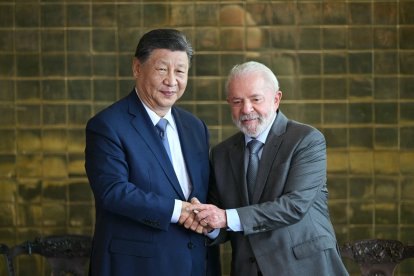
Presidents Xi Jinping and Lula da Silva, in a file image.
The development of nuclear energy in El Salvador, backed by the White House, may be an effective strategy to significantly decrease dependence on Chinese investment in Latin America, strengthening the energy sovereignty of many countries in the region and promoting a geopolitical balance more favorable to the United States. However, nuclear energy alone will not be enough of an incentive to draw a good number of Latin American countries back into the U.S. sphere of influence and away from China. Especially those whose ties and dependence with the Asian giant are deepest.
In an article published for the Center for Strategy and International Studies (CSIS), the director of the Americas Program, Ryan Berg, explained that "An effective U.S. strategy must preserve core U.S. interests in Latin America and play to both the regions and the United States’ strengths. The region must remain a hub of vibrant democracies driven by market economies. Political and economic models that are explicitly anti-Western should find no safe haven in the Western Hemisphere."
Similarly, Berg explained that the most efficient way to significantly diminish China's shadow in Latin America is based on protecting democratic vulnerabilities that the communist regime can exploit, especially in sectors such as energy and infrastructure. Likewise, Berg detailed that the White House should require countries in the region to make strategic decisions in the areas of energy and telecommunications, and offer competitive alternativesto China's investment through trade agreements and the attraction of allies such as Europe and Japan.
Evidently, the success of the agreement reached with El Salvador will depend on these types of pacts becoming the norm and not an anecdote. That both Trump and the following administrations turn their eyes to Latin America and understand that the ostracismin which the United States left this region during the last two decades was an opportunity offered on a silver platterthat the Chinese regime did not hesitate to take advantage of.
El Salvador, a laboratory country
Far from achieving the expected results, the Bitcoin project ended up failing miserably after the Salvadoran government discontinued its use as official currency, following pressure from the International Monetary Fund in the midst of negotiations for a US$1.4 billion loan. However, by that time, Bukele had already embarked on his energy project, with the goal of making El Salvador the first country in Central America with nuclear energy.
The unexpected energy plan was formally announced by Vice Chancellor Adriana Mira and the General Director of Energy, Hydrocarbons and Mines, Daniel Álvarez, who explained that the Salvadoran government signed "legal instruments with the International Atomic Energy Agency for the use of nuclear energy".
Although the project has advanced very slowly and has received strong criticism from the Salvadoran opposition and much of the Central American press, the agreement with Trump promises to considerably strengthen Bukele's nuclear policy and speed up the timeline, once again transforming El Salvador into the< b>laboratory country of the world.b> laboratory country of a political figure willing to set everything on fire if this brings him closer to materializing his ambitions.
RECOMMENDATION
